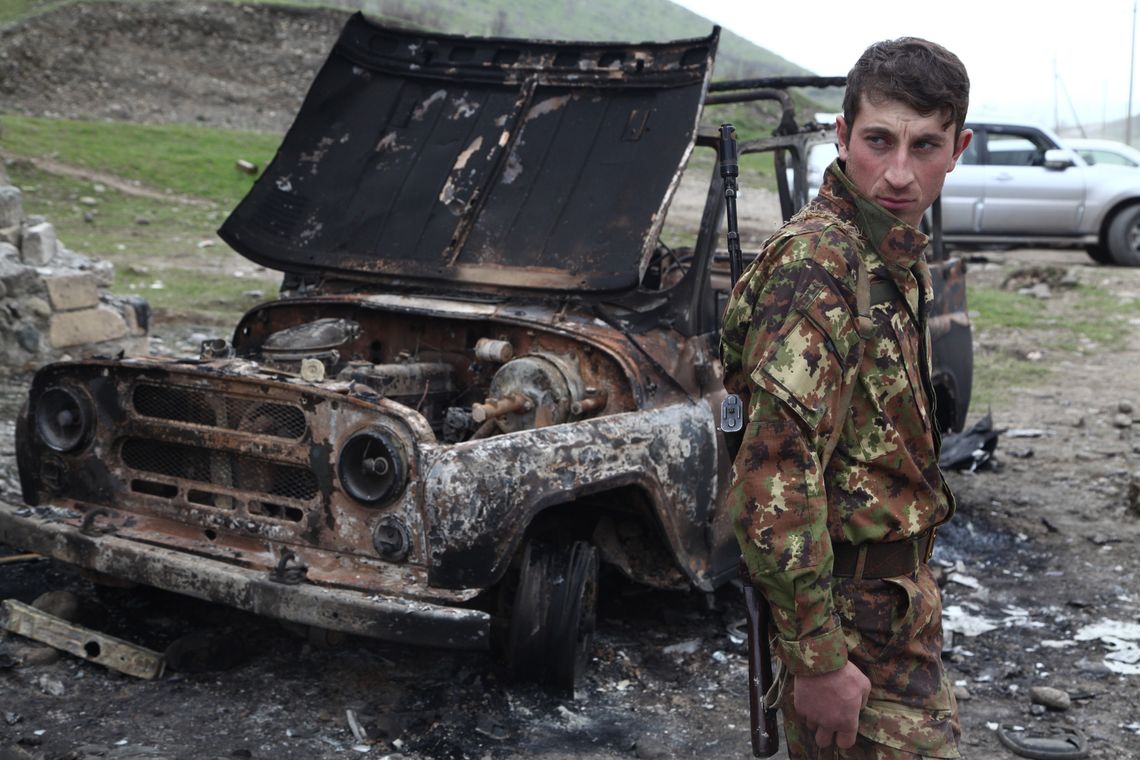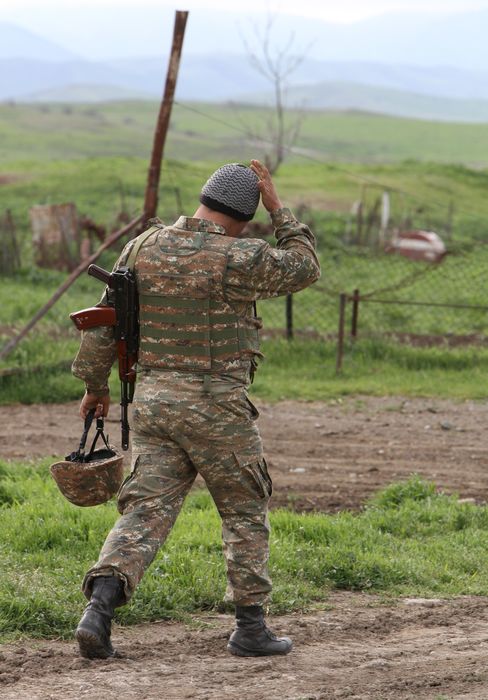
Talish, NKR. A day after the ceasefire (April 2016). Photo credit: Photolure.
“ When I think about the role of Europe in the Nagorno Karabakh conflict, I always think about Dante and the uncommitted. ”
It’s a scene from another time. Young soldiers standing with an old rifle in their hands staring at the no-man’s land in front of them for months, sometimes years. Fatigue, boredom, loneliness and fear. Contrasting feelings mixing up with the heat of summer or the ice cold of winter. That is what I witnessed in my visits to Karabakh over the last several years. I remember meeting a boy from Yerevan in a military base in Martuni, next to the frontline. After we spoke for a couple of minutes, he smiled to me and my colleague and said, “I will never forget you.” I wonder how immense his solitude must have been to say something like this.
Only time looks frozen at this frontier of Europe, not the conflict. Soldiers know that the tranquility on the front may last long, but it’s just an illusion. Hundreds of lives were lost during the Four Day War last April and in other escalations over the last few years.
In Karabakh you can see kilometres of trenches running parallel along the front, reminiscent of the ones during the Great War one hundred years ago. For a European observer, this comparison is impossible to ignore. If today we don’t have the human wave attacks that cost countless victims at that time, it’s also true that the Karabakh conflict lasted longer – more than 25 years – and is still far from a resolution.
As an Italian, I find it painful to see how trenches that look identical to those used in the Alps during the war described by Pope Benedict XV as an “useless slaughter” still exist. Analysts and media tend to insist on the geopolitical implications of the Karabakh conflict, often underlying how this small-scale confrontation could erupt one day into something bigger, with a possible domino-effect for neighbouring countries. But this is just one aspect of the conflict, and not the most urgent. Largely ignored by the international community, the conflict is also a long-lasting humanitarian crisis. An issue that, until the present day, nobody really wanted to address. Not even after the April War, and this despite several announcements made by European politicians one year ago.

The result is that entire generations of young men from the South Caucasus – and especially the poor – have seen their life marked by the traumatic experience of trench warfare. But the risk doesn’t involve only the soldiers on the frontline. Cases of bullying of recruits by senior soldiers, together with the countless episodes of abuses and suicides – alleged or real – occurring in the military bases are frequent, not to mention the periodic civilian fatalities in Karabakh or at the border of Azerbaijan and Armenia. This rather small territory has the highest per capita incidence of landmine accidents worldwide. As stated by the British organization Halo Trust, not less than a third of the cases are affecting children. Hundreds of thousands of IDPs and refugees are still living far from their cities and towns, often in miserable conditions. What is remarkable and clear is the negative effect of the conflict on the economic and democratic development of the region.
Tragedies and issues that the great majority of Europeans have completely ignored since the very beginning of this war. There could be many possible explanations for that, but absolutely no excuse. If accusations against Russia are frequent as attested to by many in the region as the main side responsible for this ongoing conflict, the real picture is much bigger. The role of Moscow is significant, of course, as we could see taking into consideration the volume of arms trade to both Azerbaijan and Armenia. But it is not only Russia that should be held accountable. As the failure of the leadership of the two rival states is also a primary factor, the truth is that the Karabakh conflict represents at the same time a major failure of the EU institutions and of the very idea of Europe.
Dante, a great political mind not less than a protagonist of world literature, put the souls of the uncommitted in the Vestibule of Hell in his “Divine Comedy.” The uncommitted represent, for him, the people unable to take sides in history, those who lack any will and decide to stay neutral at any price. In his masterpiece, the Italian poet makes no mystery of his personal contempt towards these figures, that his literary imagination punishes in the cruelest way. When I think about the role of Europe in the Karabakh conflict, I always think about Dante and the uncommitted. The point is that the moral and political responsibility of a conflict doesn’t rest solely on the actors, or those who contribute to arm them. It rests also on the nations that would have the power to intervene and stop the hostilities but prefer to keep themselves detached or indifferent. In this sense, the role of the European government and institutions is not less than criminal.
If Russia can still have so much influence on the South Caucasus until today, it’s primarily because of the absence of Europe from the regional theatre, because of the abdication from its natural role and responsibility. If the Karabakh conflict still exists and peace looks more distant than ever, it’s also our responsibility as Europeans.

